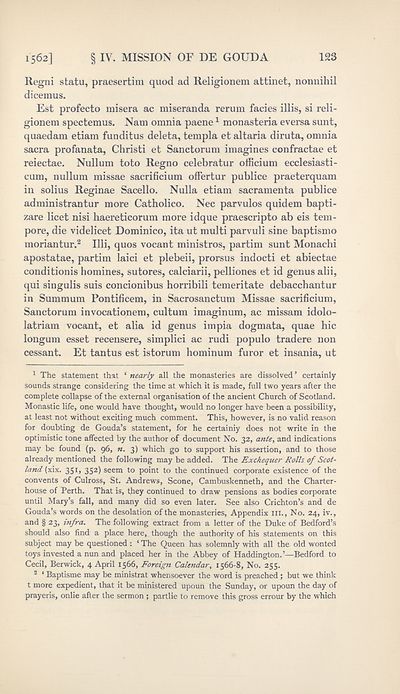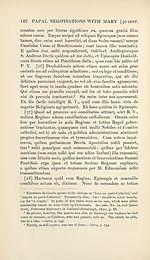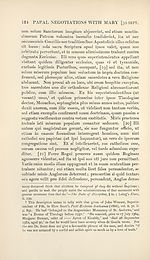Series 1 > Papal negotiations with Mary Queen of Scots during her reign in Scotland, 1561-1567
(272) Page 123
Download files
Complete book:
Individual page:
Thumbnail gallery: Grid view | List view

123
1562] § IV. MISSION OF DE GOUDA
Regni statu, praesertim quod ad Religionem attinet, nonnihil
dicemus.
Est profecto misera ac miseranda rerum facies illis, si reli¬
gionem spectemus. Nam omnia paene1 monasteria eversa sunt,
quaedam etiam funditus deleta, templa et altaria diruta, omnia
sacra profanata, Christi et Sanctorum imagines confractae et
reiectae. Nullum toto Regno celebratur officium ecclesiasti-
cum, nullum missae sacrificium offertur publice praeterquam
in solius Reginae Sacello. Nulla etiam sacramenta publice
administrantur more Catholico. Nec parvulos quidem bapti-
zare licet nisi haereticorum more idque praescripto ab eis tem¬
pore, die videlicet Dominico, ita ut multi parvuli sine baptismo
moriantur.2 Mi, quos vocant ministros, partim sunt Monachi
apostatae, partim laici et plebeii, prorsus indocti et abiectae
conditionis homines, sutores, calciarii, pelliones et id genus alii,
qui singulis suis concionibus horribili temeritate debacchantur
in Summum Pontificem, in Sacrosanctum Missae sacrificium,
Sanctorum invocationem, cultum imaginum, ac missam idolo-
latriam vocant, et alia id genus impia dogmata, quae hie
longum esset recensere, simplici ac rudi populo tradere non
cessant. Et tantus est istorum hominum furor et insania, ut
1 The statement that ‘ nearly all the monasteries are dissolved ’ certainly
sounds strange considering the time at which it is made, full two years after the
complete collapse of the external organisation of the ancient Church of Scotland.
Monastic life, one would have thought, would no longer have been a possibility,
at least not without exciting much comment. This, however, is no valid reason
for doubting de Gouda’s statement, for he certainiy does not write in the
optimistic tone affected by the author of document No. 32, ante, and indications
may be found (p. 96, n. 3) which go to support his assertion, and to those
already mentioned the following may be added. The Exchequer Rolls of Scot¬
land (xix. 351, 352) seem to point to the continued corporate existence of the
convents of Culross, St. Andrews, Scone, Cambuskenneth, and the Charter-
house of Perth. That is, they continued to draw pensions as bodies corporate
until Mary’s fall, and many did so even later. See also Crichton’s and de
Gouda’s words on the desolation of the monasteries, Appendix ill., No. 24, iv.,
and § 23, infra. The following extract from a letter of the Duke of Bedford’s
should also find a place here, though the authority of his statements on this
subject may be questioned : ‘ The Queen has solemnly with all the old wonted
toys invested a nun and placed her in the Abbey of Haddington.’—Bedford to
Cecil, Berwick, 4 April 1566, Foreign Calendar, 1566-8, No. 255.
- ‘ Baptisme may be ministrat whensoever the word is preached ; but we think
t more expedient, that it be ministered upoun the Sunday, or upoun the day of
prayeris, onlie after the sermon ; partlie to remove this gross errour by the which
1562] § IV. MISSION OF DE GOUDA
Regni statu, praesertim quod ad Religionem attinet, nonnihil
dicemus.
Est profecto misera ac miseranda rerum facies illis, si reli¬
gionem spectemus. Nam omnia paene1 monasteria eversa sunt,
quaedam etiam funditus deleta, templa et altaria diruta, omnia
sacra profanata, Christi et Sanctorum imagines confractae et
reiectae. Nullum toto Regno celebratur officium ecclesiasti-
cum, nullum missae sacrificium offertur publice praeterquam
in solius Reginae Sacello. Nulla etiam sacramenta publice
administrantur more Catholico. Nec parvulos quidem bapti-
zare licet nisi haereticorum more idque praescripto ab eis tem¬
pore, die videlicet Dominico, ita ut multi parvuli sine baptismo
moriantur.2 Mi, quos vocant ministros, partim sunt Monachi
apostatae, partim laici et plebeii, prorsus indocti et abiectae
conditionis homines, sutores, calciarii, pelliones et id genus alii,
qui singulis suis concionibus horribili temeritate debacchantur
in Summum Pontificem, in Sacrosanctum Missae sacrificium,
Sanctorum invocationem, cultum imaginum, ac missam idolo-
latriam vocant, et alia id genus impia dogmata, quae hie
longum esset recensere, simplici ac rudi populo tradere non
cessant. Et tantus est istorum hominum furor et insania, ut
1 The statement that ‘ nearly all the monasteries are dissolved ’ certainly
sounds strange considering the time at which it is made, full two years after the
complete collapse of the external organisation of the ancient Church of Scotland.
Monastic life, one would have thought, would no longer have been a possibility,
at least not without exciting much comment. This, however, is no valid reason
for doubting de Gouda’s statement, for he certainiy does not write in the
optimistic tone affected by the author of document No. 32, ante, and indications
may be found (p. 96, n. 3) which go to support his assertion, and to those
already mentioned the following may be added. The Exchequer Rolls of Scot¬
land (xix. 351, 352) seem to point to the continued corporate existence of the
convents of Culross, St. Andrews, Scone, Cambuskenneth, and the Charter-
house of Perth. That is, they continued to draw pensions as bodies corporate
until Mary’s fall, and many did so even later. See also Crichton’s and de
Gouda’s words on the desolation of the monasteries, Appendix ill., No. 24, iv.,
and § 23, infra. The following extract from a letter of the Duke of Bedford’s
should also find a place here, though the authority of his statements on this
subject may be questioned : ‘ The Queen has solemnly with all the old wonted
toys invested a nun and placed her in the Abbey of Haddington.’—Bedford to
Cecil, Berwick, 4 April 1566, Foreign Calendar, 1566-8, No. 255.
- ‘ Baptisme may be ministrat whensoever the word is preached ; but we think
t more expedient, that it be ministered upoun the Sunday, or upoun the day of
prayeris, onlie after the sermon ; partlie to remove this gross errour by the which
Set display mode to:
![]() Universal Viewer |
Universal Viewer | ![]() Mirador |
Large image | Transcription
Mirador |
Large image | Transcription
Images and transcriptions on this page, including medium image downloads, may be used under the Creative Commons Attribution 4.0 International Licence unless otherwise stated. ![]()
| Scottish History Society volumes > Series 1 > Papal negotiations with Mary Queen of Scots during her reign in Scotland, 1561-1567 > (272) Page 123 |
|---|
| Permanent URL | https://digital.nls.uk/126974397 |
|---|
| Attribution and copyright: |
|
|---|
| Description | Over 180 volumes, published by the Scottish History Society, containing original sources on Scotland's history and people. With a wide range of subjects, the books collectively cover all periods from the 12th to 20th centuries, and reflect changing trends in Scottish history. Sources are accompanied by scholarly interpretation, references and bibliographies. Volumes are usually published annually, and more digitised volumes will be added as they become available. |
|---|


